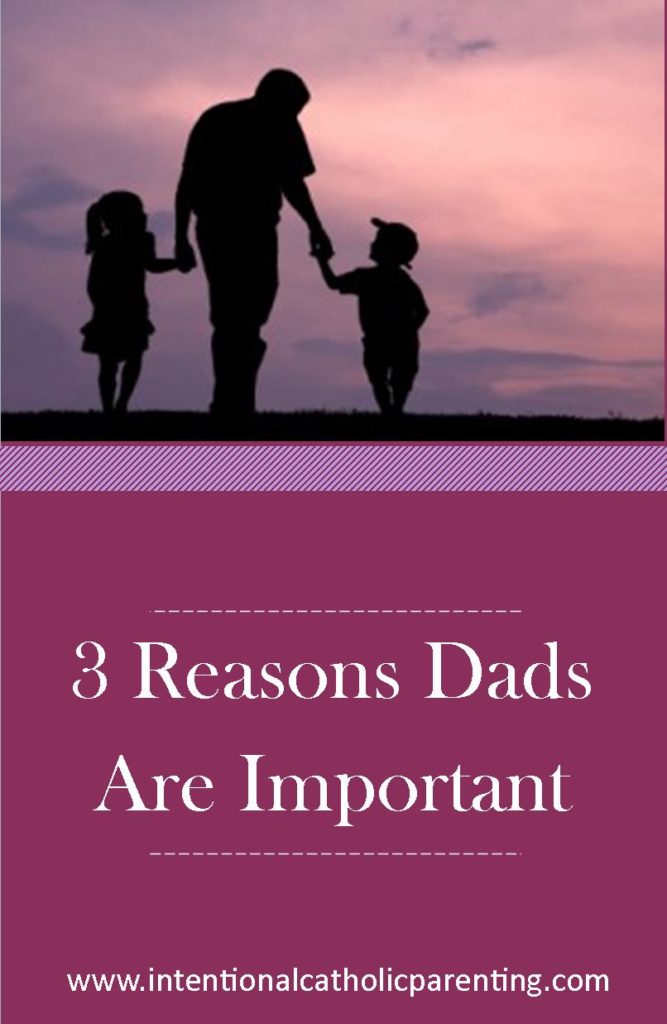My husband Philip and I were talking recently about fatherhood, not only because we just celebrated Fathers Day, but because we are on a long family road trip and I am witnessing the strength of my husband’s fatherliness every day in close quarters for many hours at a time! Philip easily outlined three specific ways dads benefit their kids and this led to fascinating discussions that I want to share with you!
1. Dads Are Not Moms Without Breasts
While our culture is barreling at breakneck speed toward neutralizing the significance of what it means to be a man and a women, copious research confirms the unique benefits that fathers bring to their kids lives. Dads are not auxiliary parents or just like a mom but with a deeper voice.
According to the American Academy of Pediatrics “studies have found that older kids with involved fathers tend to have fewer depression symptoms and behavioral problems, and lower rates of teen pregnancy. When it comes to young children, fathers can have effects on language development and mental health, according to the academy. Research has shown that dads are more likely to use new words when they talk to their babies and preschoolers, for example.”
Here’s how the Witherspoon Institute puts it in their report “Marriage and the Public Good: 10 Principles“:
Fathers excel when it comes to providing discipline, ensuring safety, and challenging their children to embrace life’s opportunities and confront life’s difficulties. The greater physical size and strength of most fathers, along with the pitch and inflection of their voice and the directive character of their speaking, give them an advantage when it comes to discipline, an advantage that is particularly evident with boys, who are more likely to comply with their fathers’ than their mothers’ discipline.
Likewise, fathers are more likely than mothers to encourage their children to tackle difficult tasks, endure hardship without yielding, and seek out novel experiences. These paternal strengths also have deep biological underpinnings: Fathers typically have higher levels of testosterone—a hormone associated with dominance and assertiveness—than do mothers. Although the link between nature, nurture, and sex-specific parenting talents is undoubtedly complex, one cannot ignore the overwhelming evidence of sex differences in parenting —differences that marriage builds on to the advantage of children.
Dads also play differently with their kids than moms. They tend to rough house and wrestle more, and this is very good for kids! Roughhousing stimulates neuron growth within parts of the brain that are responsible for memory, learning, language, and logic. Roughhousing also helps kids learn their limits and how to self-regulate; basically because they’re learning how to play without hurting somebody. Here’s a whole book on the developmental benefits of roughhousing.
2. Two Parents Are Almost Always Better Than One
Aside from the obvious differences between men and women, just having two parents around instead of one benefits kids in many ways.
According to this report, children raised in intact married families are more likely to attend college, are physically and emotionally healthier, are less likely to be physically or sexually abused, less likely to use drugs or alcohol and to commit delinquent behaviors, have a decreased risk of divorcing when they get married, are less likely to become pregnant/impregnate someone as a teenager, and are less likely to be raised in poverty.
Professor Paul Amato from Pennsylvania State University examined several studies that considered the outcomes for children living two-parent v. one-parent households. He found that children who grow up in households with two continuously married parents are less likely to experience a wide range of problems, and that children from single parent families have “more behavioral problems, more emotional problems, and lower levels of school engagement (that is, caring about school and doing homework).”
My husband made an intriguing point: when a child has two parents, he will have two models to draw from when making choices that shape his personality. When a child has only parent, the child has only one model in their minds for how to do things or how to respond to challenges. While teachers and extended family certainly play an important role in this maturing process, parents influence their child’s perceptions and personality more than any other person. With two parents to experience life with, the child may sub-consciously choose the personality and character traits that the child finds most important and useful. I think this dynamic is very complex and nuanced, but there is certainly some truth to it. Our oldest child, who will be 18 in September, clearly exhibits character traits from both his parents. Aidan is very spiritual and philosophical like me, but when in a crisis or when in engaged with somebody who is combative, he is very calm and rational like my husband. Of course, kids pick up bad personality traits from their parents, too, and sometimes a parent’s wounded personality can seriously affect his or her children on many levels. Nonetheless, I do think my husband is right: two parents give kids more to draw from when figuring out what to do in life and how to react to situations.
3. Dads Help Moms Become Their Best (or at least better) Selves
I am imagining how this road trip of ours would have gone without Philip along. It would have been much shorter and I would certainly be a lot more tired! Having him around really helps me be a better mom not just while we are traveling, but every, single day. Because of him, I’m a more calm, focused, and confident mom. When he travels on business, I find by about the third day I’m fatigued and a little cranky. I know we send women to the battle field and into the board room. No doubt, women can be fierce. They are very capable leaders, soldiers, and business owners. But thank goodness I don’t have to be everything to my children 24 hours a day, 7 days a week. Children need 100 percent from their parents, but we are human and limited. My 100 percent fades pretty quickly. The gifts Philip brings to our family are inseparable from his masculinity. Because he’s confident in his role as a father and husband, I’m freed to explore and enjoy my role as a mom and wife. And that is really great for my kids.

